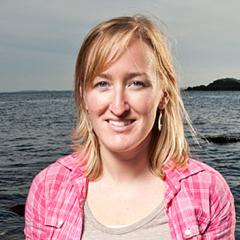McMahan's work proposing quahog farming to Mainers featured by AP
Few things are as embedded in Maine's culture — or its mud — as clams, and an environmental group thinks the key to saving the shellfish might be growing a different kind of bivalve along the state's coast.
Manomet, based in Plymouth, Massachusetts, is proposing the shellfish shift as a way to beat predators that plague Maine's clam diggers. Seafood lovers have sought Maine's softshell clams in chowders and clam rolls for decades, but wild harvesters are collecting fewer of those clams, in part because of the spread of crabs and worms that prey on them.
Manomet thinks the answer might lie in the aquaculture of quahogs, which are a harder species of clam associated more with Rhode Island and Massachusetts. The group is working with four shellfish farmers along the Maine coast to grow quahogs, study the results and bring the bivalves to market.
"Wouldn't it make sense to branch out and do this new species? One of the things that attracted us to quahogs was they seem to be less susceptible to predation from green crabs and marine worms," said Marissa McMahan, marine fisheries division director for Manomet, referencing a pair of pests that eat softshell clams.
